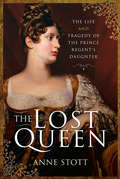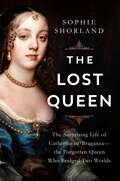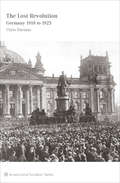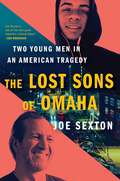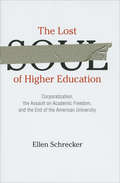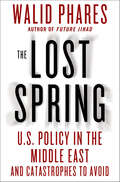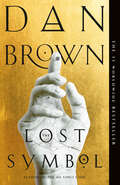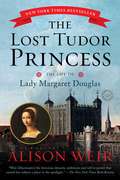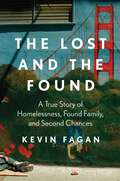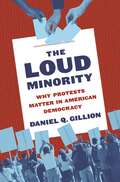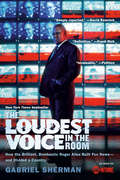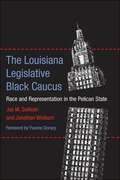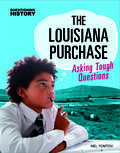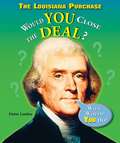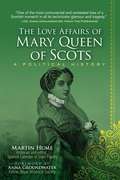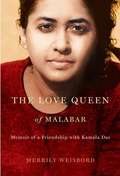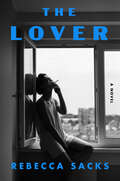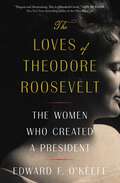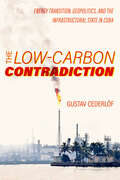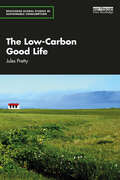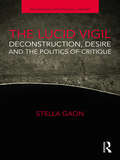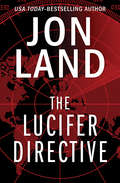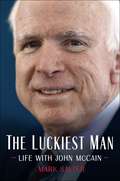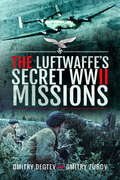- Table View
- List View
The Lost Queen: The Life and Tragedy of the Prince Regent's Daughter
by Anne M. StottA look at the tragically short life of the only daughter of Britain’s King George IV who won the heart of a nation.As the only child of the Prince Regent and Caroline of Brunswick, Princess Charlotte of Wales (1796-1817) was the heiress presumptive to the throne. Her parents’ marriage had already broken up by the time she was born. She had a difficult childhood and a turbulent adolescence, but she was popular with the public, who looked to her to restore the good name of the monarchy. When she broke off her engagement to a Dutch prince, her father put her under virtual imprisonment, and she endured a period of profound unhappiness. But she held out for the freedom to choose her husband, and when she married Prince Leopold of Saxe-Coburg, she finally achieved contentment. Her happiness was cruelly cut short when she died in childbirth at the age of twenty-one, only eighteen months later. A shocked nation went into mourning for its “people’s princess,” the queen who never was.“This perspicacious study of Charlotte’s short life is superb. Anne Stott is an accomplished and highly readable biographer whose earlier subjects have included William Wilberforce and Hannah More. She wears her research lightly—which is not to say that the book is anything less than scholastic (quite the opposite). Highly recommended.” —Naomi Clifford, author of The Murder of Mary Ashford
The Lost Queen: The Surprising Life of Catherine of Braganza—the Forgotten Queen Who Bridged Two Worlds
by Sophie ShorlandAn enthralling and vivid portrait of Queen Catherine of Braganza, wife of Charles II, that reveals her forgotten place in history.A long-overlooked figure in history, Catherine has a crucial place in the history of the British Empire: she may have failed to produce an heir to the throne, but her marriage to Charles in 1662 marked a key turning point in Britain&’s imperial ascendancy, for part of her dowry was Bombay, Britain&’s first territory of the Indian subcontinent. Catherine also was highly influential in the worlds of fashion, Baroque art and music, and food and culture. She popularized tea drinking, bringing England&’s national drink into fashion for the first time. Her life was at the nexus of Old and New worlds, war and exploration, frivolity and scientific enquiry. Noteworthy in its scope and approach to sources, The Lost Queen combines personal and political accounts, offering a lively portrait of Catherine&’s life, and the wider politics and explorations of her time.
The Lost Revolution: Germany 1918 to 1923 (International Socialism)
by Chris Harman&“Compelling . . . [a] classic study of the revolutionary process&” (Neil Davidson, author of How Revolutionary Were the Bourgeois Revolutions?). As the First World War was about to end in defeat, German sailors began to mutiny—giving voice to the widespread anger against the elites who had led the nation into war and the calamitous impact of that decision on everyday people. The events that followed would eventually result in the parliamentary democracy known as the Weimar Republic—and the socialists who had initially risen up would be attacked by German counterrevolutionary troops, their uniforms marking the debut of a new symbol: the swastika. Because of the socialists&’ defeat in Germany, Russia fell into the isolation that gave Stalin his road to power. Here, Chris Harman unearths the history of the lost revolution in Germany and reveals its lessons for the future struggles for a better world. &“Chris Harman&’s compelling analysis of the failed German Revolution covers the entire period from 1918 to the debacle of 1923, paying close attention to episodes such as the Bavarian Soviet Republic which are often neglected or minimized. Harman clearly demonstrates that this example of &‘lost revolution&’ was the real turning point in German history when history failed to turn, with dire consequences.&” —Neil Davidson, author of Discovering the Scottish Revolution
The Lost Sons of Omaha: Two Young Men in an American Tragedy
by Joe SextonFrom the award–winning journalist Bob Woodward calls "one of the truly great reporters working today," a searing, no-holds-barred account of two linked and tragic deaths stemming from the 2020 George Floyd protests that explores the complex political and racial mistrust and division of today&’s America.&“A monumental study of violence and grief...one of the most superb testaments about the confusion, despair, and—hopefully—humility that frames our century that one could ever hope to read." —Hilton AlsOn May 30, 2020, in Omaha, Nebraska, amid the protests that rocked our nation after George Floyd&’s death at the hands of police, thirty-eight-year-old white bar owner and Marine veteran Jake Gardner fatally shot James Scurlock, a twenty-two-year-old Black protestor and young father. What followed were two investigations of Scurlock&’s death, one conducted by the white district attorney Don Kleine, who concluded that Gardner had legally acted in self-defense and released him without a trial, and a second grand jury inquiry conducted by African American special prosecutor Fred Franklin that indicted Gardner for manslaughter and demanded he face trial. Days after the indictment, Gardner killed himself with a single bullet to the head. The deaths of both Scurlock and Gardner gave rise to a toxic brew of misinformation, false claims, and competing political agendas. The two men, each with their own complicated backgrounds, were turned into grotesque caricatures. The twin tragedies amounted to an ugly and heartbreaking reflection of a painfully divided country. Here, Joe Sexton masterfully unpacks the whole twisting, nearly unbelievable chronicle into a meticulously reported and nuanced account of the two deaths, explaining which claims were true and which distorted or simply false. The Lost Sons of Omaha involves some of the most pressing issues facing America today, including our country&’s dire need for gun control and mental health reform; the dangerous spread of fake news, particularly on social media; and the urgent call to band together in the collective pursuit of truth, fairness, and healing. &“A bracing, rigorously reported story—told with grace and nuance—that takes readers deep into the fault lines of today&’s America.&” —Andrea Elliott, Pulitzer Prize-winning author of Invisible Child
The Lost Soul of Higher Education: Corporatization, the Assault on Academic Freedom, and the End of the American University
by Ellen SchreckerThe professor and historian delivers a major critique of how political and financial attacks on the academy are undermining our system of higher education. Making a provocative foray into the public debates over higher education, acclaimed historian Ellen Schrecker argues that the American university is under attack from two fronts. On the one hand, outside pressure groups have staged massive challenges to academic freedom, beginning in the 1960s with attacks on faculty who opposed the Vietnam War, and resurfacing more recently with well-funded campaigns against Middle Eastern Studies scholars. Connecting these dots, Schrecker reveals a distinct pattern of efforts to undermine the legitimacy of any scholarly study that threatens the status quo. At the same time, Schrecker deftly chronicles the erosion of university budgets and the encroachment of private-sector influence into academic life. From the dwindling numbers of full-time faculty to the collapse of library budgets, The Lost Soul of Higher Education depicts a system increasingly beholden to corporate America and starved of the resources it needs to educate the new generation of citizens. A sharp riposte to the conservative critics of the academy by the leading historian of the McCarthy-era witch hunts, The Lost Soul of Higher Education, reveals a system in peril—and defends the vital role of higher education in our democracy.
The Lost Spring: U.S. Policy in the Middle East and Catastrophes to Avoid
by Walid PharesOne of the greatest unanswered questions after the massive and violent changes that hit the Middle East in 2011, known to some as the "Arab Spring" and to others as the "Islamist Winter," is how the West failed to predict both cataclysmic seasons in world affairs and to meet their challenges. The so-called spring didn't last long, quickly unraveling into a collection of civil wars, civil unrest, and secessions. Phares argues that Washington is too hesitant to take action when necessary, that US policy is highly disoriented on counter terrorism efforts, and that the effects of these errors have already proven costly. In Benghazi, US foreign policy failed to see the explosions coming, didn't meet the challenges of political transformation where and with whom it should, and failed in isolating the Jihadi terrorists worldwide. Too many strategic errors were committed. In this fascinating new book, Phares, the only expert who accurately predicted the Arab Spring, will foretell a major demise in US and Western policies in the Middle East, unless a deep change in strategies and policies are made in Washington and around the world.
The Lost Symbol: Featuring Robert Langdon (Robert Langdon #3)
by Dan BrownTHE #1 WORLDWIDE BESTSELLER FROM THE ICONIC AUTHOR OF THE DA VINCI CODE &“Impossible to put down.&” —The New York Times&“Thrilling and entertaining, like the experience on a roller coaster.&” —Los Angeles TimesFamed Harvard symbologist Robert Langdon answers an unexpected summons to deliver a lecture at the U.S. Capitol Building. His plans are interrupted when a disturbing object—artfully encoded with five symbols—is discovered in the building. Langdon recognizes in the find an ancient invitation into a lost world of esoteric, potentially dangerous wisdom.When his mentor, Peter Solomon—a long-standing Mason and beloved philanthropist—is kidnapped, Langdon realizes that the only way to save Solomon is to accept the mystical invitation and plunge headlong into a clandestine world of Masonic secrets, hidden history, and one inconceivable truth . . . all under the watchful eye of a terrifying enemy.Robert Langdon returns in Inferno, Origin, and The Secret of Secrets (coming soon)!
The Lost Tudor Princess: The Life of Lady Margaret Douglas
by Alison WeirFrom New York Times bestselling author and acclaimed historian Alison Weir comes the first biography of Margaret Douglas, the beautiful, cunning niece of Henry VIII of England who used her sharp intelligence and covert power to influence the succession after the death of Elizabeth I. Royal Tudor blood ran in her veins. Her mother was a queen, her father an earl, and she herself was the granddaughter, niece, cousin, and grandmother of monarchs. Lady Margaret Douglas, Countess of Lennox, was an important figure in Tudor England, yet today, while her contemporaries--Anne Boleyn, Mary, Queen of Scots, Elizabeth I--have achieved celebrity status, she is largely forgotten. <P>Margaret's life was steeped in intrigue, drama, and tragedy--from her auspicious birth in 1530 to her parents' bitter divorce, from her ill-fated love affairs to her appointment as lady-in-waiting for four of Henry's six wives. In an age when women were expected to stay out of the political arena, alluring and tempestuous Margaret helped orchestrate one of the most notorious marriages of the sixteenth century: that of her son Lord Darnley to Mary, Queen of Scots. Margaret defiantly warred with two queens--Mary, and Elizabeth of England--and was instrumental in securing the Stuart ascension to the throne of England for her grandson, James VI. The life of Margaret Douglas spans five reigns and provides many missing links between the Tudor and Stuart dynasties. Drawing on decades of research and myriad original sources--including many of Margaret's surviving letters--Alison Weir brings this captivating character out of the shadows and presents a strong, capable woman who operated effectively and fearlessly at the very highest levels of power. <br> <b> NAMED ONE OF THE BEST BOOKS OF THE YEAR BY THE INDEPENDENT </b>
The Lost World of British Communism
by Raphael Samuel Alison LightThe Lost World of British Communism is a vivid account of the Communist Party of Great Britain. Raphael Samuel, one of post-war Britain's most notable historians, draws on novels of the period and childhood recollections of London's East End, as well as memoirs and Party archives, to evoke the world of British Communism in the 1940s. Samuel conjures up the era when the movement was at the height of its political and theoretical power, brilliantly bringing to life an age in which the Communist Party enjoyed huge prestige as a bulwark for the struggles against fascism and colonialism.
The Lost and the Found: A True Story of Homelessness, Found Family, and Second Chances
by Kevin FaganIn the tradition of Stephanie Land and Matthew Desmond, a powerful and deeply reported narrative of homelessness, despair, and hope.Kevin Fagan&’s The Lost and the Found, set in San Francisco—one of the wealthiest cities in America—takes an empathic, character-driven approach to exploring the human side of what&’s behind the homelessness epidemic. An award-winning journalist and Pulitzer Prize nominee who has covered homelessness for decades and spent extensive time on the streets for his reporting, Fagan experienced it himself as a young man and brings a deep understanding to the crisis. He introduces us to Rita and Tyson, telling the deeply moving story of two unhoused people rescued by their families with the help of Fagan&’s reporting, and their struggle to pull themselves out of homelessness and addiction, ending with both enormous tragedy and triumph. But The Lost and the Found is not just a story of individuals experiencing homelessness, it is also a compelling look at the link between homelessness and addiction, and an incisive commentary on housing and equality. Fagan shines a sharp light on this national calamity, and in sharing Rita and Tyson&’s stories, The Lost and the Found has the potential to change the way we see and help the homeless.
The Loud Minority: Why Protests Matter in American Democracy (Princeton Studies in Political Behavior #20)
by Professor Daniel Q. GillionHow political protests and activism have a direct influence on voter and candidate behavior The “silent majority”—a phrase coined by Richard Nixon in 1969 in response to Vietnam War protests and later used by Donald Trump as a campaign slogan—refers to the supposed wedge that exists between protestors in the street and the voters at home. The Loud Minority upends this view by demonstrating that voters are in fact directly informed and influenced by protest activism. Consequently, as protests grow in America, every facet of the electoral process is touched by this loud minority, benefiting the political party perceived to be the most supportive of the protestors’ messaging.Drawing on historical evidence, statistical data, and detailed interviews about protest activity since the 1960s, Daniel Gillion shows that electoral districts with protest activity are more likely to see increased voter turnout at the polls. Surprisingly, protest activities are also moneymaking endeavors for electoral politics, as voters donate more to political candidates who share the ideological leanings of activists. Finally, protests are a signal of political problems, encouraging experienced political challengers to run for office and hurting incumbents’ chances of winning reelection. The silent majority may not speak by protesting themselves, but they clearly gesture for social change with their votes.An exploration of how protests affect voter behavior and warn of future electoral changes, The Loud Minority looks at the many ways that activism can shape democracy.
The Loudest Voice in the Room: How the Brilliant, Bombastic Roger Ailes Built Fox News--and Divided a Country
by Gabriel ShermanA deeply reported journey inside the secretive world of Fox News and the life of its combative, visionary founder. When Rupert Murdoch enlisted Roger Ailes to launch a cable news network in 1996, American politics and media changed forever. Now, with a remarkable level of detail and insight, New York magazine reporter Gabriel Sherman brings Ailes's unique genius to life, along with the outsize personalities--Bill O'Reilly, Sean Hannity, Megyn Kelly, Sarah Palin, Karl Rove, Glenn Beck, Mike Huckabee, and others--who have helped Fox News play a defining role in the great social and political controversies of the past two decades. From the Clinton-Lewinsky scandal to the Bush-Gore recount, from the war in Iraq to the Tea Party attack on the Obama presidency, Roger Ailes has developed an unrivaled power to sway the national agenda. Even more, he has become the indispensable figure in conservative America and the man any Republican politician with presidential aspirations must court. How did this man, whose life story has until now been shrouded in myth, become the master strategist of our political landscape? In revelatory detail, Sherman chronicles the rise of Ailes, a sickly kid from an Ohio factory town who, through sheer willpower, the flair of a showman, fierce corporate politicking, and a profound understanding of the priorities of middle America, built the most influential television news empire of our time. Drawing on hundreds of interviews with Fox News insiders past and present, Sherman documents Ailes's tactical acuity as he battles the press, business rivals, and countless real and perceived enemies inside and outside Fox. Sherman takes us inside the morning meetings in which Ailes and other high-level executives strategize Fox's presentation of the news to advance Ailes's political agenda; provides behind-the-scenes details of Ailes's crucial role as finder and shaper of talent, including his sometimes rocky relationships with Fox News stars such as O'Reilly and Hannity; and probes Ailes's fraught partnership with his equally brash and mercurial boss, Rupert Murdoch. Roger Ailes's life is a story worthy of Citizen Kane. The Loudest Voice in the Room is an extraordinary feat of reportage with a compelling human drama at its heart.
The Louisiana Legislative Black Caucus: Race and Representation in the Pelican State
by Jas M. Sullivan Jonathan WinburnSince the creation of the Louisiana Legislative Black Caucus in 1977, the number of black lawmakers in the Louisiana legislature has increased; however, many of the socioeconomic indicators show that the condition of their constituents has failed to improve. In The Louisiana Legislative Black Caucus, Jas M. Sullivan and Jonathan Winburn analyze the evolution of the LLBC and raise critical questions as to the effectiveness and limitations of this body of minority legislators. Sullivan and Winburn ask why the LLBC, composed entirely of Democrats, had the lowest bill-passage rate among all the groups in the legislature at the same time the Democratic Party held the majority. The inability of the LLBC to form coalitions across party lines, and even inside its own party, limits its effectiveness, the authors contend. Though LLBC members vote together more often than any other group in the legislature, their bills rarely receive support from outside the caucus. The issues faced by the LLBC's constituents often fail to garner enough support from white Democrats, a group more closely aligned with their Republican colleagues. Based on years of research and extensive interviews with caucus members, The Louisiana Legislative Black Caucus offers a deft analysis of minority representation in Louisiana that helps explain why, four decades after the LLBC was established, blacks continue to lag behind whites in key social and economic areas in the Pelican State.
The Louisiana Purchase: Asking Tough Questions (Questioning History)
by Nel YomtovWhat was the Louisiana Purchase and why was it important? How did the Louisiana Purchase change the United States? How did it affect the future for black people and American Indians? When the United States bought the Louisiana Territory from France in 1803, it would lead to historic changes for the young country. Using an inquiry-based approach, primary sources, and quick-reference infographics, readers will learn the history behind the Louisiana Purchase and how it affected the future of America and its people.
The Louisiana Purchase: Would You Close The Deal?
by Elaine LandauAt the dawn of the nineteenth century, President Thomas Jefferson dispatched Robert Livingston and James Monroe to negotiate with the temperamental French dictator Napoleon Bonaparte. <P><P>Originally charged with only securing the Port of New Orleans and access to the Mississippi River, they soon were presented with the deal of a lifetime—the purchase of the whole Louisiana Territory. With no time to contact the president, they had to make the decision themselves. What would you do if faced with the same decision?
The Love Affairs of Mary Queen of Scots: A Political History
by Martin HumeWhether you&’ve seen the recent movie starring Saoirse Ronan and Margot Robbie or the classic 1970&’s film starring Vanessa Redgrave and Glenda Jackson, this vibrant work of history will give you new insight into the life of Mary, Queen of Scots and her rivalry with Elizabeth I of England. Mary Queen of Scots, also known as Mary Stuart, was one of the most well-known and controversial monarchs of the sixteenth century. She ascended to the throne of Scotland at only six days old and would eventually become ruler of four countries at once—Scotland, England, Ireland, and France. She was intelligent, compassionate, and tolerant, despite the popularity of that time for religious persecution. Despite her popularity, Mary&’s reign was a tumultuous one: she was married three times, was forced to abdicate her throne, and was eventually imprisoned and beheaded by her cousin, Elizabeth I of England. What caused Mary&’s rapid descent from royalty? Historian and scholar Martin Hume analyzes Mary Queen of Scots&’s fall from power based on her love affairs. Though many previous historians had assumed that her downfall was caused by her lack of virtue, Hume posits that Mary&’s ruin was not based on her &“goodness or badness as a woman, but from a certain weakness of character.&” Fans of the royal families of Scotland and England, professional and amateur historians, and anyone looking to discover one of history&’s most famous and controversial women, the ups and downs of Mary Stuart&’s life and reign in The Love Affairs of Mary Queen of Scots will be educational and entertaining.
The Love Queen of Malabar: Memoir of a Friendship with Kamala Das
by Merrily WeisbordKamala Das (1934-2009) is one of India's most beloved and controversial literary figures. She was hailed and reviled as the first Indian woman to write an autobiographical cult classic about love and desire. Admirers dubbed her, "The First Feminist Emotional Revolutionary of Our Time." The tabloid press called her "The Love Queen of Malabar." Merrily Weisbord found Das's work so compelling that she flew to South India to meet her. The Love Queen of Malabar is the story of their decade-long friendship, an experiment in mutual revelation. Recounting the development of their relationship, Weisbord relates the dramatic events of Das's life, including her transition from celibacy to sexual awakening at age sixty-seven when, provoking the greatest scandal of her notorious life, she converted to Islam for love and renewal. Both observer and direct participant, Weisbord elegantly presents new biographical insights and cultural details about Kerala and India without exoticisation or stereotyping. The Love Queen of Malabar is an evocative and beautifully crafted work, as seamless as the finest novel, and will captivate readers across the globe.
The Lover: A Novel
by Bee SacksA Best in Fiction Book for 2023“Sacks is an extraordinarily gifted writer.”—Washington PostUnfolding during an invasion of Gaza, The Lover tells the story of an affair between a young Israeli soldier and a Canadian woman. The emotional realities of ideology and war begin to change the lovers, who undergo a parallel radicalization and deradicalization. This book is for anyone seeking a deeply embodied and empathetic account of the politics of love in Israel-PalestineThe story of Allison and Eyal unfolds primarily in Tel Aviv where Allie, a thoughtful and intelligent academic searching for a sense of where she belongs in the world, falls deeply and unexpectedly in love with a young Israeli doing his military service. Their love story is sensual, filled with pleasure, longing, fear, moments of deep connection, failures of communication, and ultimately, a quiet and devastating betrayal. Their romance has a rhythm private and unique to them: when he is away on military missions, they write love letters; when he returns home for weekends, they are entwined and inseparable.Allie is embraced by Eyal’s family, and their acceptance is very important to her. But when Eyal returns home from an invasion of Gaza, to which he has a surprising emotional response, Allie has changed so radically that her betrayal of her lover feels both shocking and tragic.The Lover is a provocative, immersive, gorgeously written love story reminiscent of Marguerite Duras’ classic novel. Both books portray a seductive love affair in a colonial setting, atmospheric and rich with foreign detail, that raises unsettling questions about inequality, conflict, intensity, war, and danger. At once beautiful and disturbing, propulsive and poignant, The Lover will entrance readers and hold them spellbound.
The Loves of Theodore Roosevelt: The Women Who Created a President
by Edward F. O'KeefeAn &“elegant and illuminating&” (Jon Meacham) family love story, revealing how an icon of rugged American masculinity was profoundly shaped by the women in his life, especially his mother, sisters, and wives.Theodore Roosevelt wrote in his senior thesis for Harvard in 1880 that women ought to be paid equal to men and have the option of keeping their maiden names upon marriage. It&’s little surprise he&’d be a feminist, given the women he grew up with. His mother, Mittie, was witty and decisive, a Southern belle raising four young children in New York while her husband spent long stretches away with the Union Army. Theodore&’s college sweetheart and first wife, Alice—so vivacious she was known as Sunshine—steered her beau away from science (he&’d roam campus with taxidermy specimens in his pockets) and towards politics. Older sister Bamie would soon become her brother&’s key political strategist and advisor; journalists called her Washington, DC, home &“the Little White House.&” Younger sister Conie served as her brother&’s press secretary before the role existed, slipping stories of his heroics in Cuba and his rambunctious home life to reporters to create the legend of the Rough Rider we remember today. And Edith—Theodore&’s childhood playmate and second wife—would elevate the role of presidential spouse to an American institution, curating both the White House and her husband&’s legacy. A &“graceful and powerful book&” (Candice Millard) filled with &“meticulous research [and] perceptive insights&” (The New York Times), The Loves of Theodore Roosevelt celebrates these five extraordinary yet unsung women who opened the door to the American Century and pushed Theodore Roosevelt through it.
The Low-Carbon Contradiction: Energy Transition, Geopolitics, and the Infrastructural State in Cuba (Critical Environments: Nature, Science, and Politics #13)
by Gustav CederlofIn the pursuit of socialism, Cuba became Latin America’s most oil-dependent economy. When the Soviet Union collapsed, the country lost 86 percent of its crude oil supplies, resulting in a severe energy crisis. In the face of this shock, Cuba started to develop a low-carbon economy based on economic and social reform rather than high-tech innovation. The Low-Carbon Contradiction examines this period of rapid low-carbon energy transition, which many have described as a "Cuban miracle" or even a real-life case of successful "degrowth." Working with original research from inside households, workplaces, universities, and government offices, Gustav Cederlöf retells the history of the Cuban Revolution as one of profound environmental and infrastructural change. In doing so, he opens up new questions about energy transitions, their politics, and the conditions of a socially just low-carbon future. The Cuban experience shows how a society can transform itself while rapidly cutting carbon emissions in the search for sustainability.
The Low-Carbon Good Life (Routledge-SCORAI Studies in Sustainable Consumption)
by Jules PrettyThe Low-Carbon Good Life is about how to reverse and repair four interlocking crises arising from modern material consumption: the climate crisis, growing inequality, biodiversity loss and food-related ill-health. Across the world today and throughout history, good lives are characterised by healthy food, connections to nature, being active, togetherness, personal growth, a spiritual framework and sustainable consumption. A low-carbon good life offers opportunities to live in ways that will bring greater happiness and contentment. Slower ways of living await. A global target of no more than one tonne of carbon per person would allow the poorest to consume more and everyone to find our models of low-carbon good lives. But dropping old habits is hard, and large-scale impacts will need fresh forms of public engagement and citizen action. Local to national governments need to act; equally, they need pushing by the power and collective action of citizens. Innovative and engaging and written in a style that combines storytelling with scientific evidence, this book will be of great interest to students and scholars of climate change, sustainability, environmental economics and sustainable consumption, as well as non-specialist readers concerned about the climate crisis.
The Lucid Vigil: Deconstruction, Desire and the Politics of Critique (Psychoanalytic Political Theory)
by Stella GaonStella Gaon provides the first fully philosophical account of the critical nature of deconstruction, and she does so by turning in an original way to psychoanalysis. Drawing on close readings of Freud and Laplanche, Gaon argues that Derridean deconstruction is driven by a normative investment in reason’s psychological force. Indeed, deconstruction is more faithful to the principle of reason than the various forms of critical theory prevalent today. For if one pursues the classical demand for rational grounds vigilantly, one finds that claims to ethical or political legitimacy cannot be rationally justified, because they are undone by logical undecidability. Gaon’s argument is borne out in the cases of Kantian deontology, Deweyan pragmatism, progressive pedagogy, Habermasian moral theory, Levinasian ethics and others. What emerges is the groundbreaking demonstration that deconstruction is impelled by a quasi-ethical critical drive, and that to read deconstructively is to radicalize the emancipatory practice of reason as self-critique. This important volume will be of great value to critical theorists as well as to Derrida scholars and researchers in social and political thought.
The Lucifer Directive
by Jon LandYears after hijackers killed his father, an ordinary college student gets a chance to fight terrorists who have hatched a plan to destroy the United States A ringing phone awakes Dan Lennigin, college student, in the middle of the night, and the caller baffles him with a stream of panicked gibberish. It is a code, meant for someone else&’s ears, and it draws Dan inexorably into a tangled international conspiracy. Minutes after the call, an operative for antiterrorist agency Lucifer is killed, and his superiors come for Dan. He is the only one who heard the warning, and now that he knows what is happening, he can&’t say no. Ever since his vacationing father was murdered by hijackers, Dan has dreamed about taking revenge on the world&’s terrorists. But this threat is no fantasy. It has already claimed the lives of several professional terrorist hunters, and Dan is no professional. This ebook features an illustrated biography of Jon Land including rare photos from the author&’s personal collection.
The Luckiest Man: Life with John McCain
by Mark SalterA deeply personal and candid remembrance of the late Senator John McCain from one of his closest and most trusted confidants, friends, and political advisors. More so than almost anyone outside of McCain&’s immediate family, Mark Salter had unparalleled access to and served to influence the Senator&’s thoughts and actions, cowriting seven books with him and acting as a valued confidant. Now, in The Luckiest Man, Salter draws on the storied facets of McCain&’s early biography as well as the later-in-life political philosophy for which the nation knew and loved him, delivering an intimate and comprehensive account of McCain&’s life and philosophy. Salter covers all the major events of McCain&’s life—his peripatetic childhood, his naval service—but introduces, too, aspects of the man that the public rarely saw and hardly knew. Woven throughout this narrative is also the story of Salter and McCain&’s close relationship, including how they met, and why their friendship stood the test of time in a political world known for its fickle personalities and frail bonds. Through Salter&’s revealing portrayal of one of our country&’s finest public servants, McCain emerges as both the man we knew him to be and also someone entirely new. Glimpses of his restlessness, his curiosity, his courage, and sentimentality are rendered with sensitivity and care—as only Mark Salter could provide. The capstone to Salter&’s intimate and decades-spanning time with the Senator, The Luckiest Man is the authoritative last word on the stories McCain was too modest to tell himself and an influential life not soon to be forgotten.
The Luftwaffe's Secret WWII Missions
by Dmitry Degtev Dmitry Zubov“Full of mystery and intrigue surrounding the Abwehr and the Luftwaffe secret missions supporting the insertion and less frequent extraction of agents.” —Aviation NewsThere are many vivid episodes in the operational service of the Luftwaffe’s special and secret units which engaged in the delivery of agents and saboteurs in the rear of the enemy throughout the Second World War—not just on the Eastern Front but across Asia and Europe. The activities of the pilots and crews of these squadrons, even in the Luftwaffe itself, were closed and secret. Information on the operations and missions of these units was known only to a limited number of people. It was common practice for the crew of one aircraft in these units to know nothing about the assignments of their fellow airmen.The area of activity of such units and aircraft covered the whole of Europe, North Africa, the Arctic circle, the Urals, the Caucasus, and Central Asia including Iran, Iraq, and Afghanistan. The Luftwaffe not only flew to these remote regions, but also created secret bases for their aircraft.Drawn from German and Russian sources, much of the latter only recently declassified, the authors expose for the very first time the Luftwaffe’s secret operations and reveal the fate of many of the pilots, agents and saboteurs in a story as breathtakingly dramatic as any blockbuster novel.“A most interesting account of the special Luftwaffe units that flew agents into enemy territory during WWII . . .What may surprise many readers is the extent of these operations that stretched deep into the Soviet Union and also into the Middle East and Afghanistan.” —Firetrench
